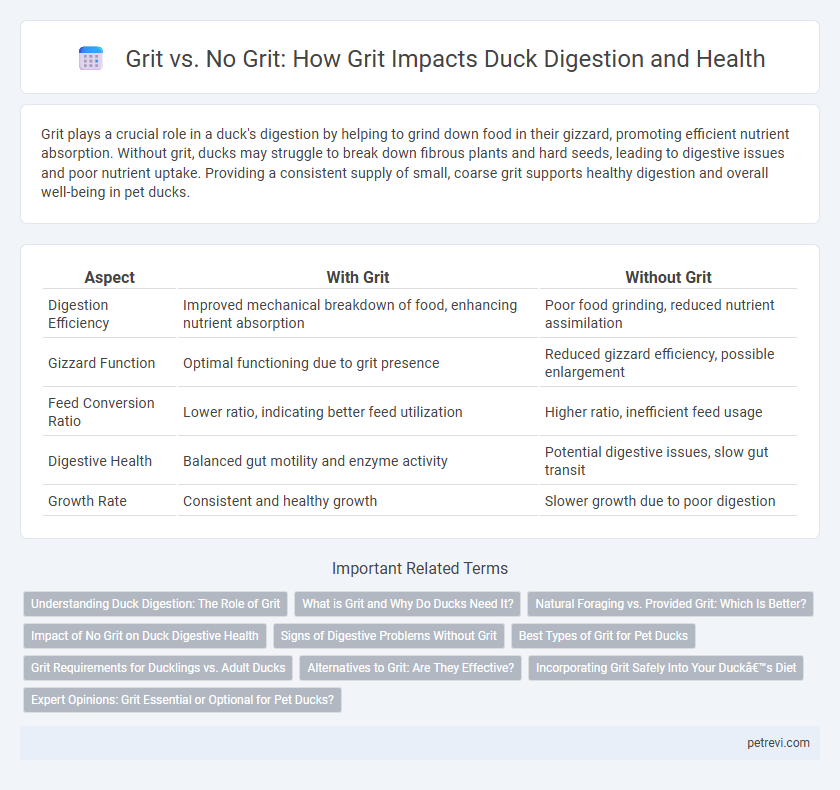Grit plays a crucial role in a duck's digestion by helping to grind down food in their gizzard, promoting efficient nutrient absorption. Without grit, ducks may struggle to break down fibrous plants and hard seeds, leading to digestive issues and poor nutrient uptake. Providing a consistent supply of small, coarse grit supports healthy digestion and overall well-being in pet ducks.
Table of Comparison
| Aspect | With Grit | Without Grit |
|---|---|---|
| Digestion Efficiency | Improved mechanical breakdown of food, enhancing nutrient absorption | Poor food grinding, reduced nutrient assimilation |
| Gizzard Function | Optimal functioning due to grit presence | Reduced gizzard efficiency, possible enlargement |
| Feed Conversion Ratio | Lower ratio, indicating better feed utilization | Higher ratio, inefficient feed usage |
| Digestive Health | Balanced gut motility and enzyme activity | Potential digestive issues, slow gut transit |
| Growth Rate | Consistent and healthy growth | Slower growth due to poor digestion |
Understanding Duck Digestion: The Role of Grit
Grit plays a crucial role in duck digestion by grinding food in the gizzard, compensating for the absence of teeth. Without grit, ducks may struggle to break down hard seeds and fibrous plant material, leading to poor nutrient absorption and potential digestive issues. Providing appropriate-sized grit ensures efficient mechanical digestion and supports overall digestive health in ducks.
What is Grit and Why Do Ducks Need It?
Grit consists of small stones or sand that ducks consume to aid in grinding food within their gizzards, enabling more efficient digestion. Without grit, ducks may struggle to break down hard seeds, grains, and fibrous plant material, leading to poor nutrient absorption and digestive issues. Providing access to appropriate grit sources is essential for maintaining healthy digestive function and overall well-being in domestic and wild ducks.
Natural Foraging vs. Provided Grit: Which Is Better?
Natural foraging offers ducks access to diverse grit types, including small stones and sand that aid in mechanical digestion by grinding food in the gizzard. Provided grit, such as calcium carbonate or granite grit, ensures a consistent and controlled supply tailored to optimize nutrient absorption and prevent digestive issues. Studies reveal ducks with access to natural forage grit typically show improved digestive efficiency and overall health compared to those relying solely on supplied grit, highlighting the benefits of an environment that mimics natural feeding behaviors.
Impact of No Grit on Duck Digestive Health
Lack of grit in a duck's diet can lead to impaired mechanical digestion, causing inefficient breakdown of food and potential digestive blockages. Without grit, ducks may experience slower nutrient absorption and increased risk of crop impaction due to insufficient grinding of hard food components. Ensuring access to suitable grit promotes optimal gizzard function and overall digestive health in ducks.
Signs of Digestive Problems Without Grit
Ducks without grit may exhibit signs of digestive problems such as lethargy, weight loss, and regurgitation due to inefficient grinding of food in the gizzard. Undigested food particles in droppings and crop impaction are common indicators of grit deficiency. Monitoring these symptoms is crucial for ensuring proper digestion and overall health in ducks.
Best Types of Grit for Pet Ducks
Grit is essential for pet ducks to aid in grinding food and improving digestion since ducks lack teeth. The best types of grit include insoluble grit made from granite or quartz, which helps physically break down food in the gizzard, and soluble grit like oyster shell, providing calcium for shell health and muscle function. Using a mix of both ensures optimal digestion and nutrient absorption in pet ducks.
Grit Requirements for Ducklings vs. Adult Ducks
Ducklings require fine, small-sized grit to aid in the breakdown of their softer, more delicate food, facilitating efficient digestion during their early growth stages. Adult ducks need coarser, larger grit to grind tougher seeds, grains, and plant materials effectively in their gizzards for optimal nutrient absorption. Proper grit size and type are essential to prevent digestive issues and promote overall health in both ducklings and mature ducks.
Alternatives to Grit: Are They Effective?
Alternatives to grit for duck digestion, such as crushed oyster shells, sand, and small pebbles, provide essential minerals and aid in mechanical breakdown of food. Research indicates that while traditional grit enhances feed efficiency and nutrient absorption, some alternatives can partially substitute but may not fully replicate the effectiveness of natural grit. Choosing appropriate-sized particles and ensuring consistent availability are critical factors for optimizing digestive health in ducks without conventional grit.
Incorporating Grit Safely Into Your Duck’s Diet
Incorporating grit into your duck's diet enhances digestion by providing necessary abrasive materials that help break down food in the gizzard. Choose safe options such as insoluble quartz grit, avoiding sharp or chemically treated substances to prevent harm. Gradually introduce grit in small quantities alongside a balanced diet of grains and greens to support optimal digestive health.
Expert Opinions: Grit Essential or Optional for Pet Ducks?
Experts remain divided on whether grit is essential for pet duck digestion, with many veterinarians emphasizing its role in grinding food within the gizzard, improving nutrient absorption and preventing digestive issues. Some authorities argue that ducks consuming natural, whole foods may not require supplemental grit, especially if their diet lacks hard seeds or grains. Optimal digestive health often depends on diet composition, the type of grit provided, and individual duck needs, highlighting the importance of tailored care in pet duck nutrition.
Grit vs No Grit for Duck digestion Infographic

 petrevi.com
petrevi.com